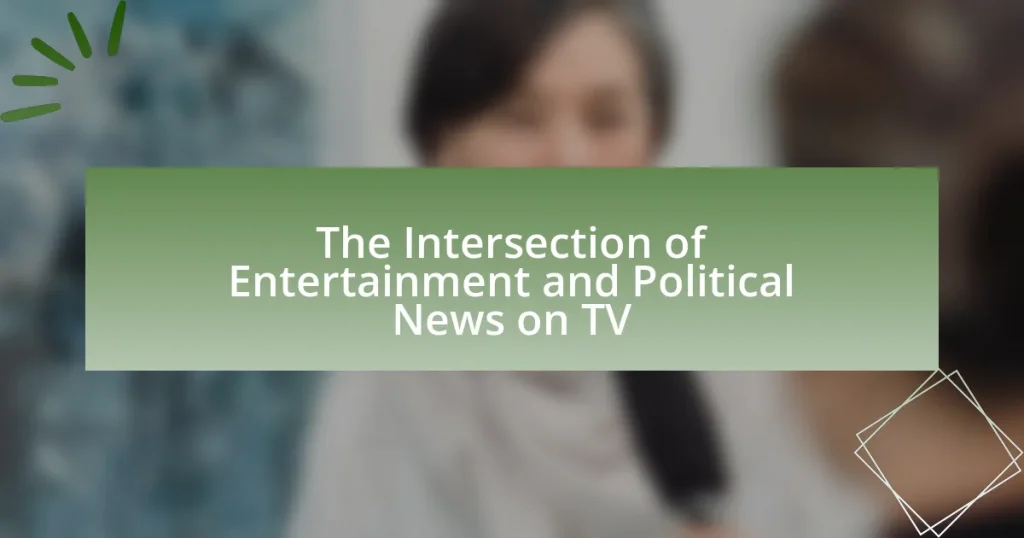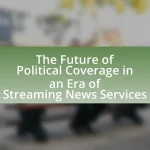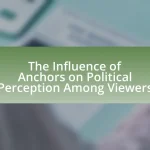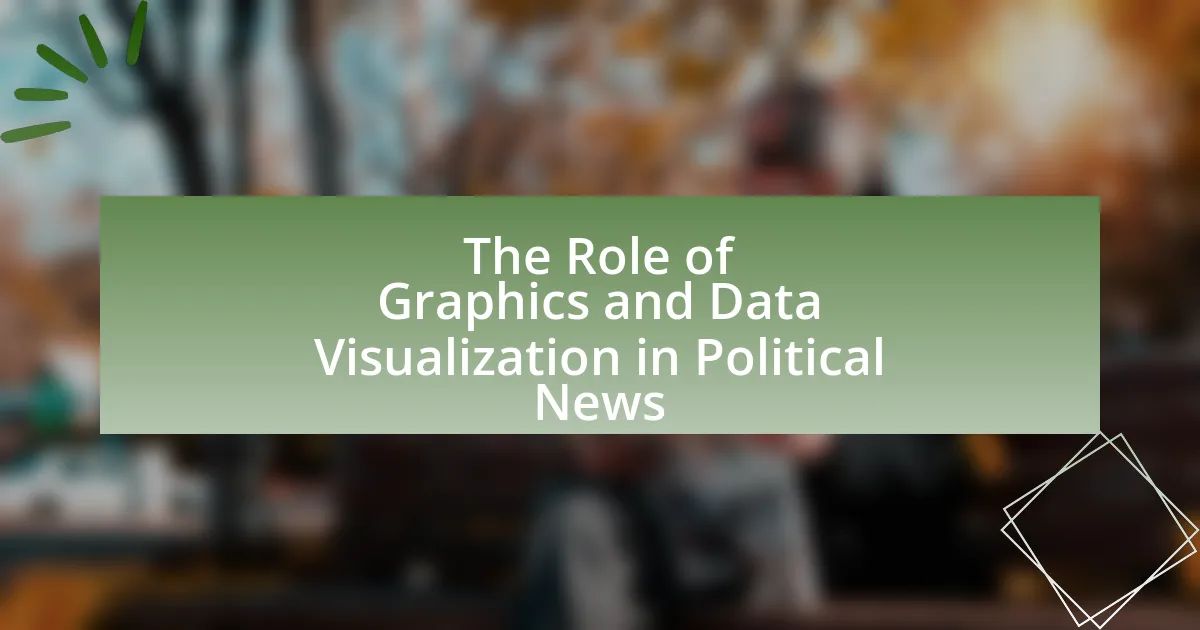The article examines the intersection of entertainment and political news on television, highlighting how this convergence enhances audience engagement and influences public opinion. It discusses the evolution of this relationship, tracing its roots from traditional news formats to the incorporation of satire and humor in programs like “The Daily Show” and “Saturday Night Live.” Key components such as infotainment, audience perceptions, and the impact of social media are analyzed, alongside the challenges of misinformation and sensationalism. The article emphasizes the significance of this intersection in shaping political discourse and voter engagement, while also addressing ethical considerations and strategies for audiences to critically engage with political content presented through entertainment.
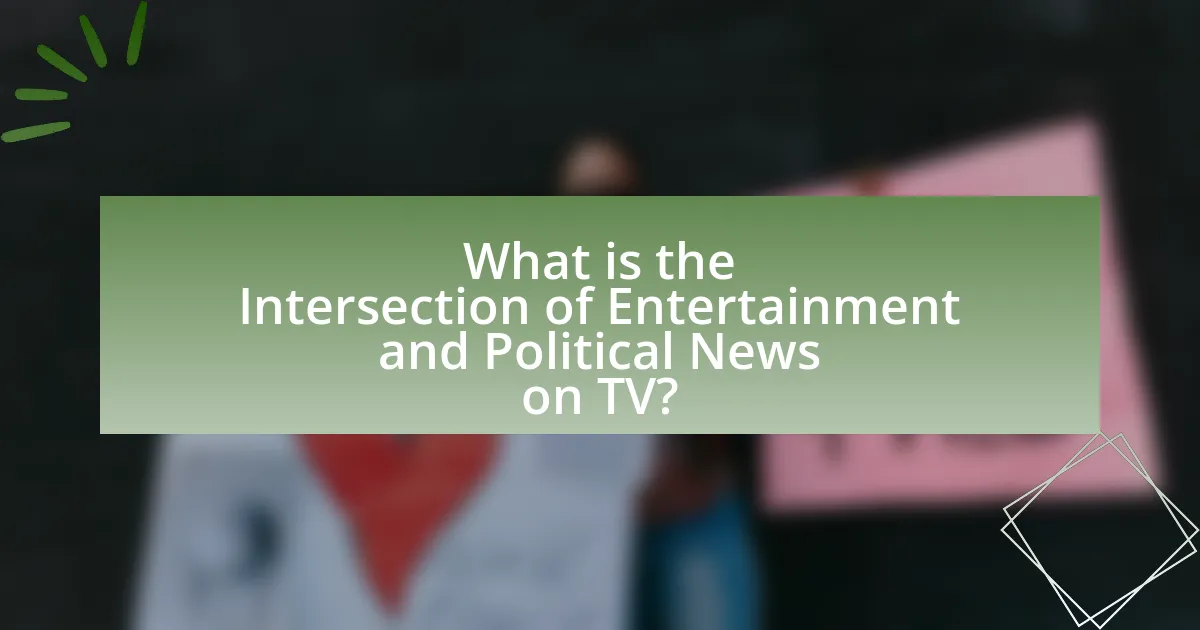
What is the Intersection of Entertainment and Political News on TV?
The intersection of entertainment and political news on TV is characterized by the blending of informative content with engaging storytelling techniques. This convergence allows political news to reach wider audiences by utilizing entertainment formats, such as satire and humor, exemplified by shows like “The Daily Show” and “Saturday Night Live,” which attract viewers who may not engage with traditional news outlets. Research indicates that these programs can significantly influence public opinion and political engagement, as they often present complex political issues in a more relatable manner, making them accessible to a broader demographic. For instance, a study by the Pew Research Center found that younger audiences are more likely to consume political news through entertainment platforms, highlighting the effectiveness of this intersection in shaping political discourse.
How has the relationship between entertainment and political news evolved over time?
The relationship between entertainment and political news has evolved from a clear distinction to a blurred line where both domains increasingly influence each other. Historically, political news was primarily serious and factual, while entertainment focused on leisure and escapism. However, since the late 20th century, particularly with the rise of cable news and social media, political news has adopted entertainment formats, such as satire and commentary, exemplified by shows like “The Daily Show” and “Saturday Night Live.” This shift has led to a greater engagement of audiences with political content, as entertainment elements make complex political issues more accessible and relatable. Studies indicate that audiences, especially younger demographics, are more likely to consume political information through entertainment media, highlighting a significant change in how political discourse is presented and received.
What historical events have influenced this intersection?
The intersection of entertainment and political news on TV has been significantly influenced by the Watergate scandal in the 1970s. This event led to a heightened public interest in political accountability and investigative journalism, prompting news networks to adopt more engaging formats that appealed to viewers. The rise of 24-hour news channels in the 1990s, such as CNN, further blurred the lines between entertainment and news, as these networks began incorporating sensationalist elements to attract audiences. Additionally, the emergence of late-night talk shows, which often feature political commentary and satire, has shaped how political news is presented, making it more accessible and entertaining for the general public. These historical events collectively transformed the landscape of political news on television, merging it with entertainment to capture viewer engagement.
How have audience perceptions changed regarding political news in entertainment?
Audience perceptions regarding political news in entertainment have shifted towards viewing it as a primary source of information rather than just a form of entertainment. This change is evidenced by the rise of programs like “The Daily Show” and “Last Week Tonight,” which blend humor with serious political commentary, attracting younger audiences who increasingly rely on these platforms for news. According to a 2020 Pew Research Center study, 61% of Americans aged 18-29 reported getting political news from social media and entertainment sources, highlighting a significant shift from traditional news outlets. This trend indicates that audiences now prioritize engaging and relatable content that addresses political issues, reflecting a broader acceptance of entertainment as a legitimate medium for political discourse.
Why is the intersection of entertainment and political news significant?
The intersection of entertainment and political news is significant because it shapes public perception and engagement with political issues. This blending allows entertainment media to reach wider audiences, making political content more accessible and relatable. For instance, programs like “Saturday Night Live” and “The Daily Show” use satire to highlight political events, influencing viewers’ opinions and increasing political awareness. Research indicates that individuals exposed to political satire are more likely to engage in political discussions and participate in voting, demonstrating the impact of entertainment on civic engagement.
What impact does this intersection have on public opinion?
The intersection of entertainment and political news on TV significantly shapes public opinion by blending informative content with engaging storytelling. This combination often leads to increased viewer engagement and emotional resonance, which can influence perceptions and attitudes toward political issues. Research indicates that programs like “The Daily Show” and “Last Week Tonight” have successfully informed audiences about political matters while also entertaining them, resulting in higher levels of political awareness and participation among viewers. For instance, a study by the Pew Research Center found that individuals who consume satirical news are more likely to discuss political topics and engage in civic activities, demonstrating the intersection’s powerful role in shaping public discourse.
How does it affect voter engagement and participation?
Entertainment and political news on TV significantly enhances voter engagement and participation by making political content more accessible and relatable. Programs that blend entertainment with political discourse, such as satirical news shows, attract larger audiences and encourage viewers to discuss political issues. For instance, a study by the Pew Research Center found that individuals who consume political content through entertainment media are more likely to participate in elections, with 61% of young voters reporting that they were motivated to vote after watching such programs. This indicates that the intersection of entertainment and political news effectively mobilizes viewers, fostering a more informed and active electorate.
What are the key components of this intersection?
The key components of the intersection of entertainment and political news on TV include infotainment, audience engagement, and the blending of news formats. Infotainment refers to the presentation of news in an entertaining manner, often using humor or celebrity involvement to attract viewers. Audience engagement is crucial, as networks utilize social media and interactive segments to foster viewer participation and feedback. The blending of news formats involves traditional news reporting being combined with entertainment elements, such as satire or dramatization, which can influence public perception and discourse. These components are evident in programs like “The Daily Show” and “Saturday Night Live,” which effectively merge political commentary with entertainment, demonstrating the impact of this intersection on audience understanding and engagement with political issues.
What role do late-night shows play in political discourse?
Late-night shows play a significant role in shaping political discourse by providing a platform for satire, commentary, and critique of political figures and policies. These programs often engage audiences through humor, making complex political issues more accessible and relatable. For instance, studies have shown that late-night comedy can influence public opinion, with viewers often citing these shows as a primary source of political information. A 2018 study published in the journal “Political Communication” found that exposure to late-night comedy correlates with increased political engagement and awareness among younger audiences. This demonstrates that late-night shows not only entertain but also inform and mobilize viewers in the political landscape.
How do satirical news programs shape political narratives?
Satirical news programs shape political narratives by using humor and satire to critique political figures and policies, thereby influencing public perception and discourse. These programs, such as “The Daily Show” and “Saturday Night Live,” often highlight absurdities in political events, making complex issues more accessible and engaging for audiences. Research indicates that viewers of satirical news are more likely to be informed about current events and develop critical thinking skills regarding political information. For instance, a study published in the journal “Political Communication” found that exposure to satirical content can lead to increased political engagement and awareness among younger audiences.

How do Entertainment and Political News Influence Each Other?
Entertainment and political news influence each other through the blending of storytelling techniques and audience engagement strategies. Political news often adopts entertainment formats, such as satire and dramatization, to capture viewer interest, as seen in programs like “Saturday Night Live,” which uses humor to comment on political events. Conversely, entertainment news can shape political narratives by highlighting celebrity endorsements or controversies, impacting public perception and voter behavior, evidenced by the significant influence of celebrity activism in recent elections. This reciprocal relationship enhances the reach and impact of both genres, as they leverage each other’s strengths to engage audiences more effectively.
What are the mechanisms through which entertainment influences political news?
Entertainment influences political news primarily through framing, agenda-setting, and emotional engagement. Framing occurs when entertainment media presents political issues in a specific context, shaping audience perceptions and interpretations. For instance, late-night comedy shows often frame political events humorously, which can lead to increased public interest and engagement in political discourse. Agenda-setting is evident when entertainment media highlights certain political topics, influencing which issues the public considers important. Research by McCombs and Shaw (1972) demonstrated that media coverage can significantly affect public priorities. Emotional engagement is facilitated through storytelling techniques in entertainment, making political news more relatable and memorable, as seen in dramatized documentaries or political satire. These mechanisms collectively enhance the impact of political news by altering audience perceptions and priorities.
How do celebrity endorsements affect political campaigns?
Celebrity endorsements significantly enhance political campaigns by increasing visibility and credibility among voters. Research indicates that endorsements from well-known figures can sway undecided voters and mobilize younger demographics, who may be more influenced by celebrities than traditional political figures. For instance, a study published in the Journal of Political Marketing found that candidates endorsed by celebrities experienced a 10% increase in voter turnout among young voters. This effect is attributed to the perceived relatability and trustworthiness that celebrities bring, making political messages more appealing and accessible.
What role does social media play in amplifying entertainment’s influence on politics?
Social media significantly amplifies entertainment’s influence on politics by providing a platform for rapid dissemination and engagement with political content. This amplification occurs as entertainment figures, such as celebrities, leverage their social media presence to shape public opinion and mobilize audiences around political issues. For instance, during the 2020 U.S. presidential election, platforms like Twitter and Instagram saw celebrities endorsing candidates and sharing political messages, which contributed to increased voter engagement, particularly among younger demographics. Research indicates that social media interactions with entertainment content can lead to heightened political awareness and participation, as evidenced by a study from the Pew Research Center showing that 55% of social media users engaged with political content shared by entertainers.
In what ways does political news shape entertainment content?
Political news shapes entertainment content primarily through satire, commentary, and narrative framing. Shows like “Saturday Night Live” and “The Daily Show” utilize political events and figures as central themes, creating humor and critique that resonate with audiences. This trend is supported by studies indicating that political satire can influence public opinion and increase political engagement, as seen in research by the Pew Research Center, which found that viewers of satirical news programs are more informed about current events compared to non-viewers. Additionally, entertainment content often mirrors political narratives, reflecting societal issues and public sentiment, thereby reinforcing the connection between politics and popular culture.
How do current events inspire comedic content in entertainment shows?
Current events inspire comedic content in entertainment shows by providing timely and relatable material that resonates with audiences. Comedians and writers often draw from political news, social issues, and cultural phenomena to create humor that reflects the zeitgeist. For instance, shows like “Saturday Night Live” and “The Daily Show” frequently incorporate recent political developments, using satire to critique and comment on current affairs. This approach not only entertains but also engages viewers in discussions about important topics, as evidenced by the significant viewership spikes during major political events or crises, highlighting the audience’s desire for humor in the context of serious issues.
What trends can be observed in political satire during election cycles?
Political satire during election cycles increasingly emphasizes hyper-partisanship and the use of social media platforms for dissemination. This trend is evident as satirical content often targets specific political figures and parties, reflecting the polarized nature of contemporary politics. For instance, shows like “Saturday Night Live” and “The Daily Show” have adapted their formats to include real-time commentary on social media, allowing for immediate audience engagement and reaction. Additionally, research indicates that political satire can influence public opinion and voter behavior, as seen in studies showing that exposure to satirical content can increase political awareness and engagement among viewers.
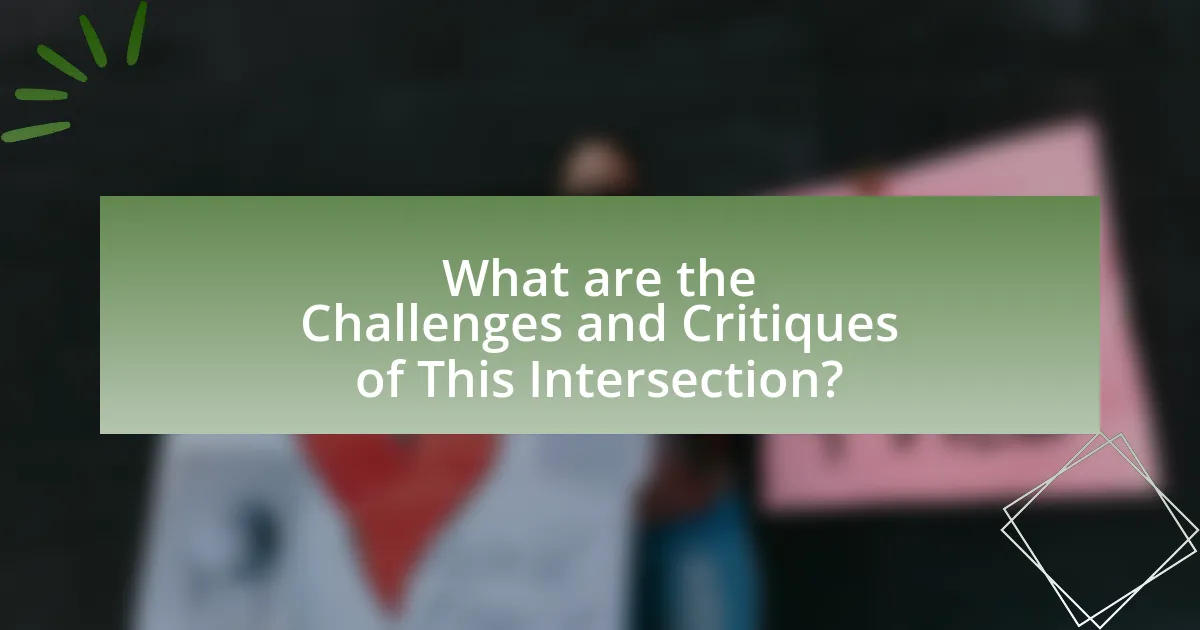
What are the Challenges and Critiques of This Intersection?
The challenges and critiques of the intersection of entertainment and political news on TV include the potential for misinformation, the prioritization of sensationalism over factual reporting, and the erosion of journalistic integrity. Misinformation can spread rapidly through entertainment-driven narratives, leading to public confusion about political issues. Sensationalism often overshadows substantive analysis, as networks may focus on engaging content rather than informative reporting, which can distort public perception. Additionally, the blending of entertainment and news can compromise journalistic standards, as reporters may prioritize entertainment value over accuracy, undermining the credibility of the news. These issues have been highlighted in studies, such as the Pew Research Center’s findings, which indicate that audiences often struggle to distinguish between news and entertainment, raising concerns about the overall impact on democratic discourse.
What criticisms are leveled against the blending of entertainment and political news?
Critics argue that the blending of entertainment and political news undermines the seriousness of political discourse. This fusion often prioritizes sensationalism over factual reporting, leading to a misinformed public. For instance, studies have shown that audiences exposed to entertainment-driven political content tend to have lower political knowledge and engagement. Additionally, the focus on entertainment can trivialize important issues, reducing complex political matters to mere entertainment segments, which can distort public perception and diminish the perceived importance of civic engagement.
How does sensationalism in entertainment affect the quality of political discourse?
Sensationalism in entertainment negatively impacts the quality of political discourse by prioritizing emotional appeal over factual accuracy. This trend leads to the oversimplification of complex political issues, resulting in a polarized audience that is more focused on entertainment value than informed debate. Research indicates that sensationalist media often distorts reality, as seen in studies showing that viewers of sensational news are less likely to engage in critical thinking about political topics. Consequently, this environment fosters misinformation and reduces the public’s ability to engage in constructive political discussions.
What are the ethical considerations in reporting political news through an entertainment lens?
Reporting political news through an entertainment lens raises significant ethical considerations, primarily concerning accuracy, sensationalism, and the potential for misinformation. Journalists must ensure that the political content remains factual and not distorted for entertainment purposes, as seen in instances where satire can mislead audiences about political realities. For example, programs like “The Daily Show” blend humor with news, which can blur the lines between entertainment and factual reporting, leading to audience misconceptions about political issues. Additionally, the prioritization of entertainment value can result in sensationalism, where the focus shifts from substantive political discourse to engaging narratives that may oversimplify complex issues. This approach risks undermining public trust in journalism and can contribute to a polarized political environment, as audiences may gravitate towards content that aligns with their biases rather than seeking balanced information.
How can audiences critically engage with this intersection?
Audiences can critically engage with the intersection of entertainment and political news on TV by analyzing the framing and presentation of news stories. This involves assessing how entertainment elements, such as humor or dramatization, influence public perception of political issues. Research indicates that the blending of entertainment and news can lead to increased viewer engagement but may also distort understanding of political realities (Dahlgren, 2009, “Media and Political Engagement: A Critical Review”). By questioning the motives behind the content, audiences can discern biases and identify the impact of sensationalism on their political views.
What strategies can viewers use to discern credible political information in entertainment?
Viewers can discern credible political information in entertainment by critically evaluating sources, cross-referencing facts, and analyzing the intent behind the content. Critical evaluation involves assessing the credibility of the creators, such as their expertise and potential biases. Cross-referencing facts with reputable news outlets or academic sources helps verify the accuracy of the information presented. Additionally, analyzing the intent behind the entertainment—whether it aims to inform, persuade, or entertain—can reveal underlying biases and agendas. For instance, a study by the Pew Research Center found that individuals who engage in fact-checking and seek diverse viewpoints are more likely to identify misinformation in political content.
How can audiences balance entertainment value with the need for informed political engagement?
Audiences can balance entertainment value with the need for informed political engagement by critically selecting media that combines both elements, such as satirical news programs that provide commentary on current events while also delivering factual information. Programs like “The Daily Show” and “Last Week Tonight with John Oliver” exemplify this balance by using humor to engage viewers while addressing significant political issues, thus encouraging informed discussions. Research indicates that viewers of satirical news shows often demonstrate higher political knowledge compared to those who consume traditional news formats, highlighting the effectiveness of this approach in fostering engagement without sacrificing entertainment.
What best practices can be adopted for navigating the intersection of entertainment and political news?
To navigate the intersection of entertainment and political news effectively, individuals should prioritize critical thinking and media literacy. Critical thinking enables audiences to analyze the motivations behind entertainment portrayals of political events, while media literacy equips them to discern credible sources from sensationalized content. Research indicates that audiences who engage in critical analysis are less susceptible to misinformation, as demonstrated by a study published in the Journal of Communication, which found that media literacy programs significantly improved participants’ ability to identify biased reporting. By applying these best practices, individuals can better understand the complexities of how entertainment influences political narratives and make informed decisions based on accurate information.
